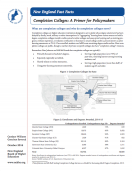The higher education policy world has been abuzz discussing and strategizing the best ways to serve adult learners—whether those adults are currently enrolled at a postsecondary institution, wish to be, or are stranded outside the system. In New England, the focus on adults is particularly relevant because experts increasingly believe economic success depends on workers with higher education credentials, yet the supply of young workers in the region is declining.
Adult students have unique challenges to beginning or completing a postsecondary degree or credential, notably, greater time and financial constraints, often due to full-time employment and/or family responsibilities. Adults also bring unique assets: They may have college credits eligible to transfer or specialized skills and knowledge that could be evaluated for college credit. The challenge for higher education is folding these experiences into a new shot at earning a degree. That’s where “completion colleges” play a role.
Completion colleges may present an affordable, alternative option for adults who’d like to attain a degree and who may otherwise turn to a private for-profit institution, some of which have been under fire lately from accreditors and consumer groups. Like many private for-profits, completion colleges are designed to serve adults who have been delayed in completing their degrees by offering more flexibility than many traditional colleges and universities.
Distinctively, completion colleges do this by aggregating credits earned at other institutions with “prior learning.” Faculty members at completion colleges assess prior learning—college-level skills and knowledge often learned outside the classroom—to ensure that students don’t have to take and pay for courses on content they have already mastered. This “prior learning assessment” (PLA) may come in forms such as student portfolios that demonstrate mastery of course content, a subject assessment offered by the completion college, industry licensure or military experience. Once prior learning credits are applied toward a degree, most of the remaining courses necessary to complete a degree can be taken online.
Currently, there are six public completion colleges (including Excelsior College, which recently became private)—two located in New England—and a handful of institutions with similar missions across the country. For policymakers, a valuable exercise may be to consider how completion colleges could be expanded to serve more adults in the region or what states without completion colleges could learn and apply from their models.
This NEBHE Policy Fast Facts is a primer on completion colleges, touching upon mission, design, whom they serve, tuition and fees, and questions that may be applicable for policymakers to address in their states.
Candace Williams is a NEBHE policy and research analyst.
[ssba]

